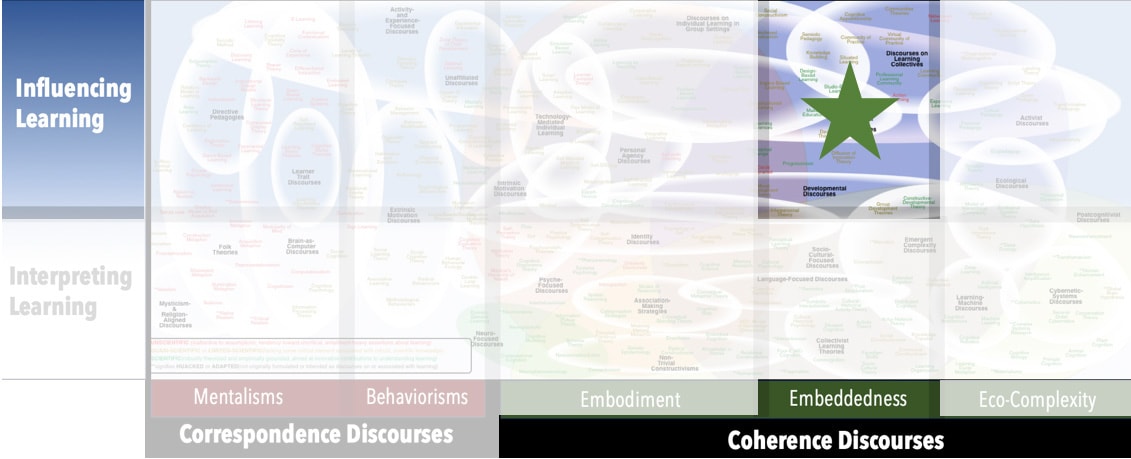Focus
Effective community action in a professional settingPrincipal Metaphors
- Knowledge is … sum of expertise in the community
- Knowing is … effective collective action
- Learner is … a member (individual) or a professional project (collective)
- Learning is … simultaneous and integrated modification of individual habits and collective process
- Teaching is … co-teaching – that is working collaboratively to positively affect one another’s habits of acting
Originated
1990sSynopsis
While conceptions and definitions vary considerably, most often a Professional Learning Community (PLC) is understood as an approach to Collaborative Learning among professional colleagues in specific work environments. Associated constructs (listed chronologically) include:- Professional Learning (PL) (1900s) – a model of Professional Development that is undertaken in collaboration with other professionals
- Professional Development (Continuing Professional Development; Continuous Professional Development; CPD; PD) (1970s)– learning activities that are undertaken to improve one’s practice and/or sophisticate one’s understandings of that practice
- Instructional Coaching (2000s) – a variously interpreted construct that most often is used to refer to situations in which mentor teachers support other teachers’ professional learning/development, especially in efforts to incorporate evidence-based practices
- Great Teaching Toolkit™ – a marketed suite of brief courses designed to support teacher Professional Development
- Teacher Talks – when used in reference to teacher Professional Development, a structured, collaboration-focused program designed to address and advance matters of local interest
Commentary
Most criticisms of PLC are focused on trivialized versions or ineffective implementations. Regarding the former, versions of PLC that are attentive to their conceptual roots in Socio-Cultural Theory tend to escape extensive criticism. Regarding the latter, the effectiveness of any practical approach to change – especially one that purports to simultaneously support individual and collective transformation – are limited by the understandings, intentions, and commitments of those involved. In a broader culture of competitive individualism, it’s not hard to imagine potholes for an approach focused on collaboration and collectivity.Authors and/or Prominent Influences
Peter Senge; Shirley M. HordStatus as a Theory of Learning
PLC is not a theory of learning.Status as a Theory of Teaching
While not a theory or model of teaching, it is not a stretch to suggest that PLC is a model of co-teaching – that is, of working together to positively affect one another’s habits of acting and interpretation, aiming to improve the ethos and effectiveness of a professional community. To that end, PLC offers extensive advice on identifying shared goals, articulating visions, seeking solutions, working collaboratively, conducting inquiries, sharing accountability, encouraging experimentation, questioning habits, and ensuring critical reflection.Status as a Scientific Theory
The most prominent versions of PLC are informed by and attentive to Socio-Cultural Theory and related perspectives. While PLC is supported by targeted empirical research, it appears that the bulk of its support is derived from its associated scientific theories of learning.Subdiscourses:
- Great Teaching Toolkit™
- Instructional Coaching
- Professional Development (Continuing Professional Development; Continuous Professional Development; CPD; PD)
- Professional Learning (PL)
- Teacher Talks
Map Location

Please cite this article as:
Davis, B., & Francis, K. (2024). “Professional Learning Community” in Discourses on Learning in Education. https://learningdiscourses.com.
⇦ Back to Map
⇦ Back to List
